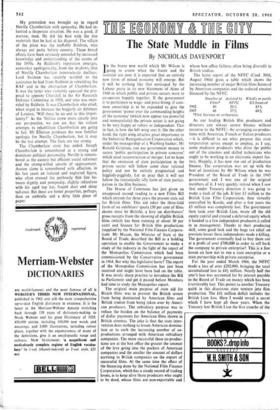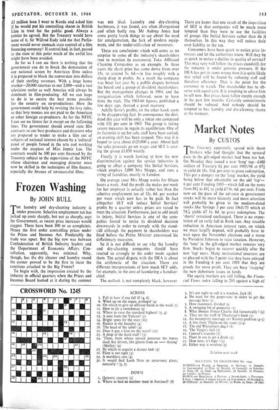The State Muddle in Films
TINE IECCA@MW A 'THE COVW
By NICHOLAS DAVENPORT
TN the brave new world which Mr Wilson is 'going to create when the freeze and the restraint are over it is expected that an entirely new form of mixed economy will emerge. But it will be nothing like that envisaged by the Labour party in its new Statement of Aims of 1960 in which public and private sectors were to co-operate happily together. If the government is to participate in wage- and price-fixing, if com- mon ownership is to be expanded to give the government 'power over the commanding heights of the economy' (which now appear too powerful and monopolistic) the private sector is not going to be very happy or robust or independent. That in fact, is how the left wing sees it. On the other hand, the right wing attaches great importance to the Industrial Reorganisation Corporation which, under the managership of a Warburg banker, Mr Ronald Grierson, can use government money to secure 'public participation in private concerns' which need reconstruction or merger. Let us hope that the extension of state participation in the private sector will follow some clear rational policy and not be entirely pragmatical and higgledy-piggledy. Let us pray that it will not follow the fantastically silly form of state partici- pation in the film business.
The House of Commons has just given an unopposed second reading to a new Films Bill which extends for three years the present state aid for British films. This aid takes the three-fold form of an exhibitors' quota (30 per cent of films shown must be British), a levy on distributors' gross receipts from the showing of eligible British films (which has been running at about 50 per cent) and finance for British film productions (supplied by the National Film Finance Corpora- tion). Mr Mason, the Minister of State at the Board of Trade, described the Bill as a holding operation to enable the Government to make a study of the industry in the light of the report of the Monopolies Commission which had been commissioned by the Conservative government in 1964. But why this legislative haste? The report of the Monopolies Commission has just been received and might have been laid on the table. It was surely sharp practice to introduce the Bill to Parliament and get it passed before Members had time to study the Monopolies report.
The original main purpose of state aid for British films was to prevent the British screen from being dominated by American films and British studios from being taken over by Amen. can producers. The subsidiary purpose was to reduce the burden on the balance of payments of dollar payments for American films shown in British cinemas. The joke is that the state inter- vention does nothing to lessen American domina- tion or to curb the increasing number of co- produotions arranged with American subsidiary companies. The more successful these co-produc- tions are at the box office the greater the amount of the levy going into the pockets of American companies and the smaller the amount of dollars accruing to British companies on the export of successful films. At the same time the effect of the financing done by the National Film Finance Corporation, which has a steady record of trading losses, is to keep alive those producers who ought to be dead, whose filmS are non-exportable and whose box office failures often bring discredit to British studios.
The latest report of the NFFC (Cmd. 3066, August 1966) gives a table which shows the increasing number of major British films financed by American companies and the reduced amount financed by the NFFC.
Number of Assisted by Wholly or partly Films* NFFC US financed
1962 46 26% 43% 1965 48 17% 64% *First features or co-features.
As our leading British film producers and directors can always secure finance without recourse to the NFFC—by arranging co-produc- tions with American, French or Italian producers —it is difficult to see what purpose this state corporation serves except to employ, as I say, some mediocre producers who drive the public out of the cinemas and skilled technicians who ought to be working in an electronic export fac- tory. Happily, it has now run out of production finance. The corporation was set up with the best of intentions by Mr Wilson . when he was President of the Board of Trade in the 1945 governmenf and I was one of the original members of it. I very quickly retired when I saw that under Treasury direction it was going to make a hash of the job. It lent £3 million to the British Lion Film Corporation, then virtually controlled by Korda, and after a few years the £3 million was completely lost. The government then took over British Lion, wrote off the old equity capital and created a deferred equity which it handed to a few independent producers it called in as management. Thanks to their producing skill, some good luck and the huge tax relief on previous losses these independents made a killing. The government eventually had to buy them out at a profit of over £700,000 in order to sell back the company to private enterprise! This is a fine lesson on how not to run a state enterprise or a state partnership with private enterprise.
For the year ended March 1966, the NFFC made a loss of over £292,000, bringing the total accumulated loss to £44- million. Nearly half the year's loss was accounted for by interest payable to the Board of Trade on money which has been irretrievably lost. This points to another Treasury quirk in this disastrous state venture into film production. The £41 million deficit includes the British Lion loss. Here I would reveal a secret which I have kept all these years. When the Treasury lent British Lion the first tranche of the £3 million loan I went to Korda and asked him if he would put his controlling shares in British Lion in trust for the public good. Always a patriot he agreed. But the Treasury would have none of it. Sir Wilfred Eady told me that Parlia- ment would never stomach state control of a film financing company! If control had, in fact, passed to the state at this point much of the awful loss might have been avoided.
As far as I can see there is nothing that the government can do to break the domination of our national screen by American films unless it is prepared to block the conversion into dollars of their sterling revenues. With a huge home market-20,000 cinemas to our 2,000-and a vast television outlet as well America will always be dominant in film-producing. All we can hope to do is to secure the best terms possible for the country on co-productions. Here the government could help by revising the levy rules, so that levy monies are not paid to the American or other foreign co-producers. As for the NFFC I can see no future for it except on the following lines. The government should award state film contracts to our best producers and directors who are prepared to tender to make a film out of subjects of national interest chosen by a 'cultural' panel of people famed in the arts and working under the auspices of Miss Jennie Lee. The contracts would be 100 per cent financed by the Treasury subject to the supervision of the NFFC whose chairman and managing director must now be skilled in the techniques of film finance, especially the finance of unsuccessful films.







































 Previous page
Previous page